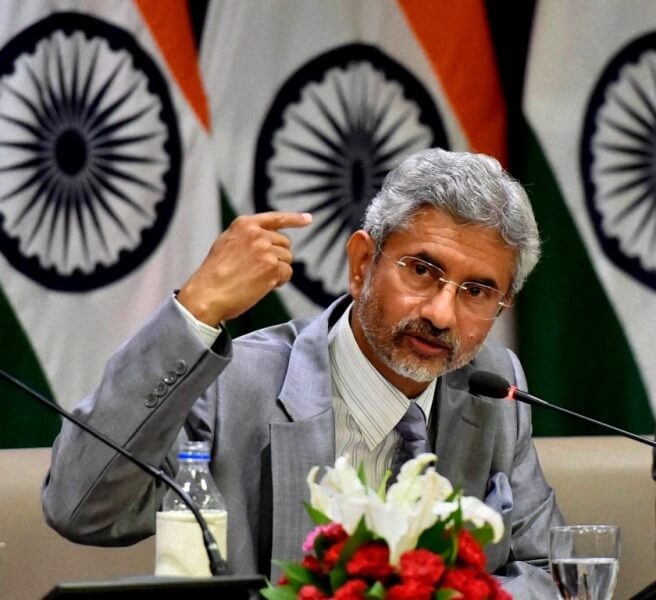Uninterrupted supply of food and essential items from India to West Asian states and the role of energy security in post-COVID-19 economic recoveries figured in External Affairs Minister Subrahmanyam Jaishankar’s recent conversations with his counterparts from several Middle East countries.
Negative social media posts from fake handles that went viral in some West Asian countries also figured in these conversations and Jaishankar and his counterparts agreed these efforts were aimed at impacting the special relations between India and countries in the Middle East, people familiar with developments said on Friday, 24 April 2020.
The welfare of some 8 million Indian expatriates in West Asian states – who account for annual remittances of about $40 billion– also figured in Jaishankar’s conversations with his counterparts, including those from the Gulf Cooperation Council (GCC) states, the people cited above said on condition of anonymity.
Jaishankar had telephone conversations with the foreign ministers of Saudi Arabia and Oman on Thursday and with the foreign ministers of Qatar, the United Arab Emirates (UAE) and Palestine on Friday, 24 April 2020. He earlier spoke to his counterparts from Bahrain, Kuwait and Algeria.
A cordial conversation with FM @MBA_AlThani_ of #Qatar. Discussed our #coronavirus experiences. Thanked him for taking care of the Indian community. Such challenging times will only further strengthen our friendship.
— Dr. S. Jaishankar (@DrSJaishankar) April 24, 2020
These conversations were a follow-up to Prime Minister Narendra Modi’s telephone discussions with leaders of GCC countries such as Saudi Arabia, the UAE, Qatar, Kuwait, Bahrain and Oman and the leaders of Palestine, Jordan and Egypt. Modi’s conversations emphasized the “strong bilateral relations and the priority attached by India to ‘Think West’ in its foreign policy”, said one of the people cited above.
Pandemics further highlight the need for international cooperation. Few better examples than our relationship with #UAE. Applaud the generosity of spirit and clarity of policy that has characterised its approach. Thank HH @ABZayed for the warm conversation today.
— Dr. S. Jaishankar (@DrSJaishankar) April 24, 2020
“The Gulf countries import large quantities of food and other essential items from India, and the special efforts made by us to ensure uninterrupted supply of these items was appreciated by the external affairs minister’s counterparts,” the person said.
“The post-COVID-19 economic recovery, particularly its energy implications, came up for discussion as India is a key market for crude oil coming from West Asia,” the person added.
The people said negative social media posts from fake handles, such as the one impersonating an Omani princess, had “come in for adverse attention” from West Asian governments. “Both sides realise that such attempts are intended to create discord in the special relations between India and countries of the region,” said the person cited above.
Welcomed speaking with FM Riad Al Malki of #Palestine. Discussed the #coronavirus situation. Assured him of Indian medical assistance.
— Dr. S. Jaishankar (@DrSJaishankar) April 24, 2020
The West Asian states, the people pointed out, are very sensitive to attempts to create social disharmony and have zero-tolerance in such matters.
Over the past few days, a handful of Indians were either fired from their jobs or faced legal action in the UAE over their social media posts that were deemed Islamophobic. Princess Hend Faisal al Qassemi, a member of the UAE’s royal family, criticized these social media posts and emphasized India’s secular background. The Omani princess issued a clarification that she had no connection to the fake tweet from an account impersonating her.
Jaishankar’s counterparts from GCC countries appreciated the contributions made by Indians to the growth and prosperity of those nations. “These countries have been very supportive and have gone the extra mile in taking care of the welfare of Indians in these trying times and the external affairs minister expressed his deep gratitude for their efforts,” a second person said.
Many West Asian countries have sought essential medicines such as hydroxychloroquine and paracetamol from India to support their efforts against the COVID-19 pandemic. India has already supplied or is in the process of providing these medicines to Saudi Arabia, Bahrain, Oman, Qatar, Egypt, and Palestine as humanitarian aid and on a commercial basis, the people said.
At the request of Kuwait, India deployed a rapid response team comprising doctors, nurses, and paramedics to train and exchange best practices with local professionals for the containment and treatment of COVID-19. India has also helped the embassies of West Asian states to evacuate their citizens from different parts of the country.
The foreign ministers of some Middle Eastern countries requested that their medical personnel currently in India should be allowed to go back, and Jaishankar has assured them this matter will be given sympathetic consideration, the people said.

Like!! Thank you for publishing this awesome article.